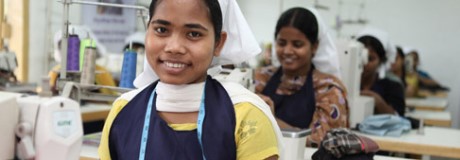
Our clothing – a fair deal?
23.11.2015 - Bangladesh sews the world’s clothes – and what citizens, governments and the private sector can do to help seamstresses earn a decent living from their work was the topic of the ‘Development Forum’.
‘Saving is sexy, but unfair’, said Gerd Müller, German Federal Minister for Economic Cooperation and Development. If a simple t-shirt in a shop in Germany costs just EUR 2.50, it left Bangladesh at a price of 80 cents, he explained. ‘That’s a 300 per cent increase in value within three weeks.’
Since a garment factory in Rana Plaza collapsed, claiming the lives of more than 1,000 people in April 2013, Federal Minister Müller has been committed to improving working conditions for seamstresses. Last year he launched the Partnership for Sustainable Textiles. So far, 160 of 400 German textile companies have joined the Partnership, including Otto-Versand, C&A, Adidas and Kik. Together they account for 50 per cent of the German market. Tanja Gönner, Chair of the GIZ Management Board, noted that it was impressive how much had been achieved in such a short time. The secretariat of the Partnership is hosted by GIZ, which has been working in Bangladesh for many years on behalf of the German Federal Government.
Higher environmental and social standards
Since 2010, GIZ has advised more than 2,000 factories employing about 1.5 million workers on how to improve their social and environmental standards. The European Union is co-financing these measures. 350 factories have been certified according to international labour standards. 200 factories are now saving up to 40 per cent of energy compared to their previous consumption levels or are treating their contaminated wastewater.
With GIZ’s help, non-governmental organisations in Bangladesh have opened 19 women’s cafés, where seamstresses learn about their rights and receive medical care. About 200,000 workers have received assistance in this way, and 20,000 of them have been trained in negotiation techniques. They know the legal social standards and conduct negotiations with the factory managers. These negotiations have helped resolve over 7,000 disputes in factories.
The panel discussion on working conditions in the textile industry took place on 19 November in Frankfurt. Panellists Gerd Müller and Tanja Gönner were joined by Thomas Voigt, Vice President Corporate Communications of the Otto Group, and Berndt Hinzmann from INKOTA-netzwerk e.V., an association that is actively involved in promoting fair working conditions in the textile industry. Frankfurter Rundschau editor Tobias Schwab moderated the event. The ‘Development Forum’ is an event series by Frankfurter Rundschau, hr-iNFO and GIZ.